- Home
- Q. Patrick
Death for Dear Clara Page 3
Death for Dear Clara Read online
Page 3
“I mean it, John.”
The laughter faded. A shadow dulled the brown velvet of the man’s eyes as they settled on the paper-knife.
“Anything like that, Clara, would just make things decidedly unpleasant for yourself.”
“I can’t help it.” Mrs. Van Heuten laid down the knife with a gesture of finality. “I’m giving you three days to make up your mind. After all, this is my business. I have to live.”
“Don’t be too sure of that, Clara.” John Smith leaned across the desk, the irises of his eyes suddenly paling to a light hazel. “I rather think,” he said softly, “that you’re beginning to bore me, Mrs. Van Heuten. I came here today because I was interested in finding out just how impertinent you had the nerve to be. But I came for another reason, too. This, my dear Clara, is very final, positive and ultimate. I want no more of you or your letters or your respectably veiled threats.”
He lit a cigarette, the match flame spurting very near her face. “And as for your proposed fireworks, I’m afraid you’ll either find they’re damp or they’ll have a kick-back that would injure nobody but yourself.”
Mrs. Van Heuten drew herself up with cold dignity. “Very well, John. We know where we stand.”
“Thank God I’m not standing in those charmingly precarious shoes of yours. And something tells me, Clara, that you’ll very soon be realizing just how precarious they are.” John Smith laughed unpleasantly and stood up. “Well, I’ve got to catch the plane back home, and there’s not much more for us to say.”
He moved toward the door. His voice had resumed its bantering smoothness. “I’m disappointed in you, Clara. This reunion with the friend and mentor of my youthful efforts could have been so delightful.”
At the threshold he paused, his smile half revealing the cruel perfection of his teeth.
“Even so, I’m still fond of you, Clara—extremely, inordinately fond. Once you gave me advice. Here’s some for you. Nice, white-haired ladies don’t let off fireworks. They’re very apt to contain dynamite. Goodbye.”
The interview had been distinctly unpleasant, but it seemed to have ruffled only the surface of Mrs. Van Heuten’s mellow serenity. Association with authors, young and old, had accustomed her to temperamental outbursts. With a little shrug, she lost herself once more in contemporary literature.
Her pencil hovered like that of an indulgent schoolmistress. Sometimes she would run it distressedly through a phrase that was too modern or too outspoken. Mrs. Van Heuten was broadminded, but still old-fashioned enough to believe that marriage and not literature was the place for sex.
She had made brisk suggestions on one unintelligible short story and a few all too intelligible lyrics, when Madeleine Price appeared again.
“A Mr. Robert Bristol.”
“How tiresome! Another of my failures. Really, I wish you would tell him …”
She broke off as Bobby Bristol swung past the secretary into the room. The boy who had described Mrs. Van Heuten as his only real friend was very pale. His hair was a shade more untidy, his face even more drawn than when he had left his wife. He dropped into a chair, his fingers rolling and unrolling the ends of his shabby necktie.
“Why, Bobby, what’s the matter?” Mrs. Van Heuten’s tone was anxious and comforting.
“The matter?” Robert Bristol’s lips trembled. “Listen, Mrs. Van Heuten, if I don’t talk to someone—God knows what I’ll do. And you’re the only friend I’ve got now. Helen’s not coming back. She wants a divorce.”
Brokenly, he poured out to her all that had passed between him and his wife. The sound of his own voice must have done something to soothe him. The narration was turbulent at first but it sounded to Clara Van Heuten less like a personal record than a dramatic synopsis for a modern tragedy. She listened in silence, her face registering both genuine and professional sympathy.
“Well, that’s that.” Bobby’s voice was taut, jerky. “What am I going to do, Mrs. Van Heuten?”
She did not answer for a moment, but gazed at him thoughtfully.
“I’m glad you came to me, Bobby,” she said at length. “Your mother was one of my dearest friends. And I can’t help feeling partly responsible. After all, it was through my getting your manuscript placed with Salter’s that you met Helen in the first place.”
Robert Bristol shrugged wearily.
“And you mustn’t let this hurt you too much, my dear. You’ve always been so highly strung.” Mrs. Van Heuten’s tone was sensibly soothing. “Perhaps it isn’t such a tragedy after all. To be perfectly frank, Bobby, I always thought that Helen was a little—interested.”
“What do you mean?” Robert Bristol looked up sharply.
“Well, my dear, if you really want to know …” Mrs. Van Heuten’s voice held just the correct shade of worldly wisdom. “You were the son of a very rich man when you married Helen, Bobby. And she—she had nothing except her looks and a small position in the art department at Salter’s. You were a very good catch for any girl.” She cleared her throat and then added hurriedly, “Of course, I wouldn’t dream of saying a thing like that if Helen’s actions hadn’t more or less proved me right. Now that your poor father’s dead and there was that dreadful trouble about his estate, she left you at a time when the right sort of wife would have done her utmost to stand by you.”
“She didn’t—she didn’t marry me just because I had money.” Bobby Bristol sprang to his feet, his eyes suddenly blazing. Then he threw out his hands. “What’s the use, anyway? Everything’s such a frightful mix-up. Thank God, there’s still the novel. You’ve—you’ve heard anything from Salter’s?”
“N-no.” A guarded expression slipped into Mrs. Van Heuten’s eyes. “But I wrote a special note to Larry Graves when you sent them the manuscript. I made a point of it.”
Bobby hesitated and then said impulsively: “It’s disgusting that it should be Graves of all people who has to decide on my book. Of course, Helen hasn’t said anything. But I could tell from little things. I’m practically sure he’s the man she wants to marry.” He laughed bitterly. “My publisher stealing my wife! That’s about the last straw. I’m going round this afternoon. I expect they’ll break the news of their romance to me then. Very gently and considerately.”
Mrs. Van Heuten’s eyelids flickered. For a moment she seemed lost in thought. Then she picked up the telephone and said: “Get me Salter’s, please, Madeleine.” Cupping the mouthpiece with her hand, she shot Bobby a little sympathetic smile. “As you’re going round there right away, Bobby, I feel I must put in another word for the book.”
Bristol shrugged. He had dropped back into a chair again, drumming restlessly on the arms.
“Oh, Salter’s? Mrs. Bristol, please.… Is that you, Helen? This is Clara Van Heuten. Bobby’s here with me at the moment.” Her voice over the wire was sweet and rueful. “Helen, I’m terribly sad that you’re planning a divorce. So sad. No, of course, I’m not going to put my oar in. I know how useless it is for an outsider to—well, to break in between man and wife.”
For a moment she paused, her face intently cheerful as she listened to words from the other end of the phone.
“No, Helen, I didn’t call about that. It’s purely business. Of course, I know that you have nothing to do with the handling of manuscripts. But I wanted to call you unofficially and ask you to use your influence with Mr. Graves for Bobby’s novel. He’s coming round to you this afternoon to hear the decision. I’m sure you’ll do all you can, but before you come to any agreement, it’s only fair to remember that the royalties on his last book aren’t settled yet. I know I’m not an agent, but Bobby’s so impractical. I do feel someone should take care of his financial interests. I’m sure that you will agree …”
She broke off, listening.
“Yes, I’m glad you get my point, Helen. I know the first venture wasn’t very successful for you. But if we can get Mr. Graves interested, there’s no reason why we shouldn’t make it all up on the second. What’s that, Helen
? … Oh.”
With a little grimace, Mrs. Van Heuten hung up. Her kindly eyes turned to Bobby who asked quickly:
“Did she say anything about Graves liking the book?”
“No, my dear. She hadn’t spoken to him about it.” Mrs. Van Heuten moistened her lips. “But we mustn’t be too optimistic, Bobby. Authorship’s very precarious, you know. I always wanted to be a writer myself, but when my husband died and left me even worse off than you are, I found I had to drop everything creative and get down to work.”
“You think I ought to get a job?”
“Well, we all have to be a little commercial these days, Bobby.” Mrs. Van Heuten glanced with satisfaction around her well-appointed office. “I haven’t done so badly. And I’m sure you can make good, too. After all, you’re a Bristol.”
She paused and added with a cautious glance at the boy’s uncared-for appearance: “But as a friend of your poor dear mother’s—just one word of advice. Make yourself a little more presentable, Bobby. Get your hair cut, your suit pressed. You …”
She broke off at the sound of a door opening. Both she and Bobby Bristol turned sharply to see a middle-aged man appearing rather furtively around a tall screen which cut off the rear left corner of the room.
“Oh, it’s you, Dane.”
Mrs. Van Heuten flashed a smile at Dane Tolfrey and economically expanded the remnants of it on Bristol.
“Well, Bobby, best of luck. And keep your chin up.”
“The subject of chins is a sore one.”
As Bristol hurried out of the room, Dane Tolfrey, who had called Mrs. Van Heuten the most respectable woman in New York, fingered his swollen chin and dropped into a chair. Whimsically, and with unquenchable jauntiness, he described his encounter at the Longval that morning with the man in tweeds.
“Oh dear,” murmured Mrs. Van Heuten sympathetically. “He’s been here, too. An impossible person. There’s nothing to do about him except to write him off as a bad debt.”
“Guess he was a mistake,” muttered Tolfrey. “And, incidentally, I came here to stop you making another mistake.” His pouched eyes looked rather malicious. “Remember that young writer I recommended to you—Derek Muir?”
“Why, yes. He telephoned for an appointment this afternoon.”
“Well, thought he might be pretty good at first—seemed to have talent. But I’ve changed my mind. He drinks milk and he’s just a gigolo. No one who drinks milk’s any good as an author—or anything else, if you ask me. Thumbs down, I’d say.”
“I certainly don’t want anything to do with a gigolo,” said Mrs. Van Heuten primly. “The violet shirt is passé these days, anyway. Everyone’s after the virile, hardboiled type of author. I’ll count Mr. Muir out.”
“And while we’re on the subject of counting, Clara,” Dane Tolfrey’s florid face moved confidentially closer, “a little loan might not come amiss.”
“How much?” Mrs. Van Heuten’s voice was suddenly cautious.
“Five hundred would save me the embarrassment of borrowing elsewhere.”
Rather reluctantly, Mrs. Van Heuten produced a check book, scribbled a check for three hundred and fifty dollars.
“You know, Dane,” she said, handing it to him, “as my oldest friend, I’m leaving you a little money in my will, but there won’t be any left if you go on asking for these loans.”
Tolfrey eyed the check a trifle disappointedly. “My dear Clara, you’ll outlive me by centuries.”
“I certainly will if you go on drinking and gambling, Dane.” Mrs. Van Heuten gave a little laugh. “You know, you ought to settle down and get married.”
“Alas!” Tolfrey shook his head with maudlin self-mockery. “Often an usher, my dear, but never a bridegroom.” He rose rather unsteadily to his feet. “I will depart as discreetly as I came—through the washroom.”
“Oh, Dane, I meant to scold you about that back entrance. I’ve told you a hundred times I don’t like you using it when clients are here.”
“Sorry, my dear, so forgetful.…”
“Well, don’t forget my cocktail party this evening. Six-thirty.”
As he passed the desk, Tolfrey bent and planted a light kiss on the soft waves of Mrs. Van Heuten’s hair.
“Neither death, drunkenness nor damnation could keep me from one of your charming parties, Clara.”
He crossed noiselessly to the screen and disappeared.
When the secretary came in again, Mrs. Van Heuten’s delicate nostrils were still crinkled in distaste at the whiff of alcohol which had accompanied the chaste salute of her old friend.
“Mr. Derek Muir.”
“Oh, show him in, Madeleine.”
The young man for whom Mrs. Van Heuten was a potential miracle worker drifted in, very cool and immaculate. With one glance her eyes appraised the startling smoke-blue suit, the over-accentuated pattern of important shirt and tie, the gray suède shoes.
“Good afternoon, Mrs. Van Heuten.”
Derek Muir handed her the card on which Tolfrey had scribbled his unconventional introduction … A very accomplished Killer. She passed it back after the briefest of glances.
“Oh yes, Mr. Muir, of course.”
“I wandered in to find out the status of my talent.” Derek Muir arranged himself and the knife-edge creases of his unpaid-for trousers in a chair. “Have you come to a decision?”
“Yes, Mr. Muir.” Mrs. Van Heuten’s tone was at once bright, final and motherly. “I’ve read your manuscripts and I’m afraid I have bad news for you.”
“I’m monotonously used to bad news.” Derek Muir’s jaded shrug showed no hint of the tottering dream castles. “I gather you’re going to reject me?”
“As you know, Mr. Muir, I’m very individual in my choice of clients. I have several silly little whims. Some people I feel I can help. But—” her hands fluttered in a charmingly feminine gesture—“certain fields are rather outside my province. I can’t deal with anything—er—violent.”
“Too bad.” Muir’s almond eyes lowered ruefully to the smoke-blue suit. “I suppose that means sending these back to the tailor. He’ll be relieved to see them again. My credit never was very dependable.”
“I’m sorry, Mr. Muir.” Mrs. Van Heuten had picked up the engraved paper-knife again and was twisting it idly. “I can’t help all young authors who are in need, you know.”
“Only too depressingly true.” Derek Muir rose, fingered the foulard of his tie and strolled to the door. “By the way, Mrs. Van Heuten,” he added slowly, “I know very little about you. But you appear to have some rather tempestuous acquaintances. I gather that some of your other would-be clients do not accept disappointment with the admirable resignation which I myself am endeavoring to show.”
Something about his gaze disturbed Mrs. Van Heuten. His eyes were fixed not on her face, but on her hands. At first she thought he was looking at the large solitaire diamond in her ring, then she realized that it was at the hard steel of the paper-knife clasped between her fingers. For a moment she felt a little dizzy. She dropped the knife with a clatter.
Derek Muir was smiling. “I didn’t mean to alarm you, Mrs. Van Heuten. Despite Mr. Tolfrey’s quaint introduction, I’m as gentle as a lamb and devastatingly harmless. Good afternoon.”
Mrs. Van Heuten did not return to her manuscripts. She sat very still, her fingers stroking the soothing softness of the chrysanthemum petals. Her serenity was less convincing now. She looked older, somehow unsure of herself. Once her eyes fell on the paper-knife and flicked quickly away.
“Four ladies are in the office.”
She started at the brisk voice of the temporary secretary.
“Four ladies? Who are they?”
Madeleine Price spoke the names in the voice of one who is determined not to be impressed. “Mrs. Hobart, Beatrice Kennet, Gilda Dawn and the Princess Walonska.”
“But—what do they want?”
“They didn’t say. They insist on seeing you together.”
“Together? You mean they came together?” Mrs. Van Heuten’s tone had lost its briskness. “You’d better ask them in.”
The door closed behind the secretary and opened again seconds later. Four women entered. Each of them carried in a gloved hand a new black briefcase.
“Oh, how nice of you all to drop in!” said Mrs. Van Heuten a shade too cordially.
Her visitors did not reply. The Princess Walonska moved purposefully toward the desk. Her finely sculptured face was pale and determined, the gray eyes hard and impervious as slate. Beatrice Kennet was at her side, a sardonic smile on her lips, as though she had just conjured up one of her poisonous epigrams. Behind them, Gilda Dawn stood in ominously languorous profile, her nails gleaming scarlet against the briefcase.
Only Susan Hobart stood apart. She hesitated by the door, wide-eyed and tremulous like a frightened child entrusted with an infernal machine.
“And you’ve each brought a manuscript! Well, this is a pleasant surprise. Won’t you sit …?”
Mrs. Van Heuten’s voice trailed off, her checks had turned a delicate ivory.
The four women were gazing at her now with expressions all different, yet all similar in their implacability.
“Yes. We do want your help with a manuscript.”
It was Patricia Walonska who finally spoke, but it seemed somehow to Clara Van Heuten that all of those four amazingly contrasted visitors had framed the words.
“Quite an unusual manuscript.” The Princess’s gloved hand tugged at the zipper of her briefcase.
Clara Van Heuten had opened her mouth to speak but no words came. Her eyes had rested on Patricia’s opening briefcase only to widen in blank terror as they moved to those of the three other women.
For, lying in the dark interior of each case, she had seen—not a manuscript, but a small black revolver.
III
It was almost half an hour since the Princess Walonska and her companions had taken their unsmiling departure. Madeleine Price was bent over her typewriter, pounding out letters with determined concentration.

 Death Goes to School
Death Goes to School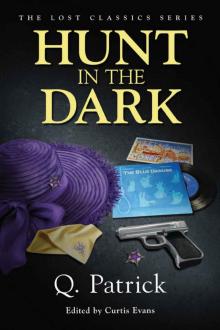 Hunt in the Dark
Hunt in the Dark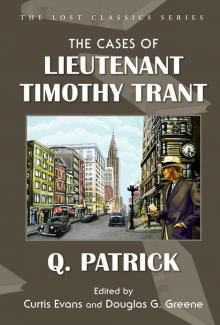 The Cases of Lieutenant Timothy Trant (Lost Classics)
The Cases of Lieutenant Timothy Trant (Lost Classics) Death for Dear Clara
Death for Dear Clara S.S. Murder
S.S. Murder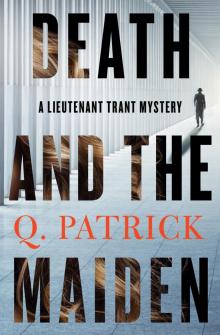 Death and the Maiden
Death and the Maiden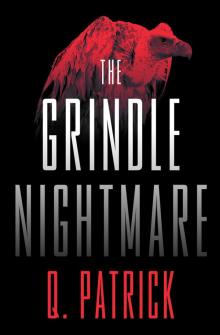 The Grindle Nightmare
The Grindle Nightmare Cottage Sinister
Cottage Sinister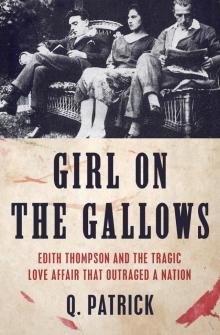 The Girl on the Gallows
The Girl on the Gallows